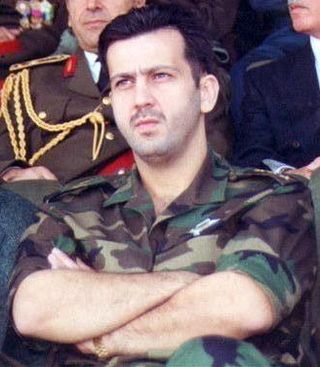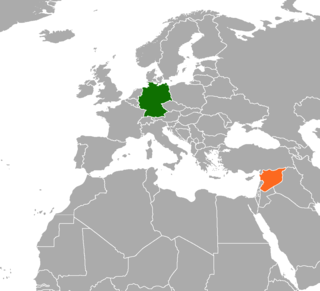The illegal drug trade, drug trafficking, or narcotrafficking is a global black market dedicated to the cultivation, manufacture, distribution and sale of prohibited drugs. Most jurisdictions prohibit trade, except under license, of many types of drugs through the use of drug prohibition laws. The think tank Global Financial Integrity's Transnational Crime and the Developing World report estimates the size of the global illicit drug market between US$426 and US$652 billion in 2014 alone. With a world GDP of US$78 trillion in the same year, the illegal drug trade may be estimated as nearly 1% of total global trade. Consumption of illegal drugs is widespread globally, and it remains very difficult for local authorities to reduce the rates of drug consumption.
Narcoterrorism, in its original context, is understood to refer to the attempts of narcotics traffickers to influence the policies of a government or a society through violence and intimidation, and to hinder the enforcement of anti-drug laws by the systematic threat or use of such violence. As with most definitions of terrorism, it typically only refers to non-state actors.

Narco-state is a political and economic term applied to countries where all legitimate institutions become penetrated by the power and wealth of the illegal drug trade. The term was first used to describe Bolivia following the 1980 coup of Luis García Meza which was seen to be primarily financed with the help of narcotics traffickers.

Rifaat Ali al-Assad, known as the "Butcher of Hama", is a Syrian former military officer and politician. He is the younger brother of the late President of Syria, Hafez al-Assad, and Jamil al-Assad, and the uncle of the former President Bashar al-Assad. He was the commanding officer of the ground operations of the 1982 Hama massacre ordered by his brother.

Major General Maher Hafez al-Assad is a Syrian former military officer who served as commander of the Syrian Army's elite 4th Armoured Division, which, together with Syria's Military Intelligence, formed the core of the Ba'athist regime's security forces until its collapse in 2024. He is the younger brother of former Syrian president Bashar al-Assad, and also was a member of the Central Committee of the Syrian Ba'ath Party.

Fenethylline or fenetylline (INN) is a codrug of amphetamine and theophylline and so a mutual prodrug of both. It is also spelled phenethylline; other names for it are amphetaminoethyltheophylline and amfetyline. The drug was marketed for use as a psychostimulant under the brand names Captagon, Biocapton, and Fitton. The name "Captagon" is often used generically to describe illicitly produced fenethylline.

Syria, officially the Syrian Arab Republic, is a country in West Asia located in the Eastern Mediterranean and the Levant. It is bounded by the Mediterranean Sea to the west, Turkey to the north, Iraq to the east and southeast, Jordan to the south, and Israel and Lebanon to the southwest. It is under a transitional government and comprises 14 governorates. Damascus is the capital and largest city. With a population of 25 million across an area of 185,180 square kilometres (71,500 sq mi), it is the 57th-most populous and 87th-largest country.

The Syrian civil war is an ongoing multi-sided conflict in Syria involving various state-sponsored and non-state actors. In March 2011, popular discontent with the Ba'athist regime ruled by Bashar al-Assad triggered large-scale protests and pro-democracy rallies across Syria, as part of the wider Arab Spring protests in the region. After months of crackdown by the government's security apparatus, various armed rebel groups such as the Free Syrian Army began forming across the country, marking the beginning of the Syrian insurgency. By mid-2012, the insurgency had escalated into a full-blown civil war.
In politics, a mafia state is a state system where the government is tied with organized crime to the degree when government officials, the police, and/or military became a part of the criminal enterprise. According to US diplomats, the expression "mafia state" was coined by Alexander Litvinenko.

Foreign involvement in the Syrian civil war refers to political, military and operational support to parties involved in the ongoing conflict in Syria that began in March 2011, as well as active foreign involvement. Most parties involved in the war in Syria receive various types of support from foreign countries and entities based outside Syria. The ongoing conflict in Syria is widely described as a series of overlapping proxy wars between the regional and world powers, primarily between the United States and Russia as well as between Iran and Saudi Arabia.

Violent incidents took place on the arid 379 km (235 mi) Jordan–Syria border over the course of the Syrian Civil War.

Saudi Arabia–Syria relations refer to bilateral and economic relations between Saudi Arabia and Syria. Diplomatic ties between these two countries of the Middle East have long been strained by the major events in the region. Saudi Arabia has an embassy in Damascus, and Syria has an embassy in Riyadh. Both countries are members of the Arab League and share close cultural ties.

From the 2000s until the fall of the Assad regime, the Islamic Republic of Iran and the Syrian Arab Republic were close strategic allies, and Iran provided significant support for the Syrian Ba'athist government in the Syrian civil war, including logistical, technical and financial support, as well as training and combat troops. Iran saw the survival of the Assad regime as being crucial to its regional interests. When the uprising developed into the Syrian civil war, there were increasing reports of Iranian military support, and of Iranian training of the National Defence Forces both in Syria and Iran. From late 2011 and early 2012, Iran's IRGC sent tens of thousands of Iranian troops and Shi'ite foreign paramilitary volunteers in coordination with the Syrian government to prevent the collapse of the regime; thereby polarizing the conflict along sectarian lines.

Timber Sycamore was a classified weapons supply and training program run by the United States Central Intelligence Agency (CIA) and supported by the United Kingdom and some Arab intelligence services, including Saudi intelligence. The aim of the program was to remove Syrian president Bashar al-Assad from power. Launched in 2012 or 2013, it supplied money, weaponry and training to Syrian opposition groups fighting Syrian government forces in the Syrian Civil War. According to US officials, the program was run by the CIA's Special Activities Division and has trained thousands of rebels. President Barack Obama secretly authorized the CIA to begin arming Syria's embattled rebels in 2013. The program became public knowledge in mid-2016.
Use of mind-altering substances in warfare has included drugs used for both relaxation and stimulation. Historically, drug use was often sanctioned and encouraged by militaries through including alcohol and tobacco in troop rations. Stimulants like cocaine and amphetamines were widely used in both World Wars to increase alertness and suppress appetite. Drug use can negatively affect combat readiness and reduce the performance of troops. Drug use also poses additional expenses to the health care systems of militaries.

Germany–Syria relations are the bilateral relations between the Federal Republic of Germany and the Syrian Arab Republic. Germany closed its Damascus embassy and stopped its recognition of Bashar Al-Assad in 2012 because of the Syrian civil war, but did not cut relations with the former Ba'athist regime until its official collapse in late 2024.

Corruption in Syria follows the familiar patterns of state-based corruption, namely government officials abusing their political powers for private gain in the country of Syria.
The illegal drug trade in Lebanon involves an expanding Lebanese involvement in both drug production and trade, a phenomenon substantiated by studies. The economic and political upheaval in Lebanon, as delineated in a study by the Euro-Gulf Information Center, has driven Hezbollah, wherein narcotics serve as a notable revenue stream, to intensify its involvement in the drug economy. Western intelligence agencies estimate that Lebanon produces over 4 million pounds of hashish and 20,000 pounds of heroin annually, generating profits exceeding US$4 billion. According to The Washington Post, Lebanon's drug industry contributes substantially to the country's economy, accounting for over half of its foreign-exchange earnings.

Nouh Zaiter is a Lebanese drug lord and a leader of an armed militia in the Beqaa Valey, involved in drug trafficking and arms dealing in Lebanon and the Middle East. He's often in the news due to his alleged connections with Hezbollah and the Syrian regime, and his involvement in the drug trade, particularly Captagon.














